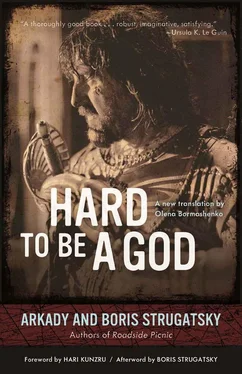Arkady and Boris Strugatsky
HARD TO BE A GOD
Translated by Olena Bormashenko
The sorrow that tortured me, the shame that overwhelmed me, the desperation that wracked my mind, all these I could then feel, but even now I can find no words to express them.
—Pierre Abelard
Now one thing I have to tell you. In this particular show you have to be armed to enforce your authority. But you’re not to use your weapon under any circumstances. Under any circumstances. Is that quite clear?
—Ernest Hemingway

There are always schisms, even in medieval fantasy. Weird tales are weird in more than one way. One the one hand we have a rural tradition, sentimental, conservative, and wedded to absolute notions of good and evil. This is the English school of Tolkien and Lewis, in which Christ-lions and schoolchildren fight cosmopolitan witches and wizards with suspiciously foreign names. The nasty working classes of industrial Mordor threaten the exurban tranquility of the Shire, a place full of morally centered artisans and small tradesmen, destined, once the dwarves build the railway and the elves finally get out of their hot tubs and invent the Internet, to end up as commuters. Elsewhere Anglo-Saxon Potters and Weasleys, first cousins of the hobbits, take on effete Norman-French Malfoys and Voldemorts. Fantasy of this kind is intended as comfort and consolation, which is why it’s often written for and marketed to children. One can retreat from the ambiguities of the real world into the greenwood, where the demarcation between right and wrong is clear. In the final pages, the reign of King John will come to an end and good King Richard will return, heralding a time of merriment and feasting.
In the English tradition, the city is conspicuous by its absence. But there’s a countertradition, sexy and cynical, devoted to the romance of urban life, with its giddying complexity, its taverns and towers, its markets and locked doors and alleyways. In Viriconium or Lankhmar or King’s Landing, there are thieves and rogues and sorcerers and beautiful women at high windows. In such fantastical cities, shadows abound and good doesn’t always prevail. It’s a type of romance that owes more to Paris (the city of Dumas’s musketeers and the Baudelairean flaneur) than medieval chivalry or Icelandic sagas. So when Hard to Be a God deposits us in Arkanar, we may feel we know where we are. Don Rumata, swashbuckling swordsman, bon viveur, and wit, is no Bilbo Baggins, blushing when required to talk to a lady. And Arkanar is a far cry from Camelot or Gondor. Its citizens delight in hanging “suspicious bookworms” and the noble lord is clearly accustomed to using his blade against boors, footpads, and impertinent members of the lower orders.
However, this is no reactionary celebration of aristocratic derring-do. Rumata is really Anton, an emissary from a future Earth where Communism has triumphed, creating a rational, benevolent society that can only look on the filth and cruelty of this backward world with disgust. Rumata/ Anton is an operative working on behalf of Earth historians, studying the feudal mores of the planet with a view to assisting them to “progress” along the straight and narrow path of history. Unlike their Yankee contemporaries (who always seem to be planting moonbases and generally making themselves at home on alien planets), the enlightened peoples of the Noon Universe don’t intervene as imperialists. Anton isn’t the probe-head of some future project of settlement or colonization. Instead he’s a kind of human webcam, feeding video back to his home planet, even as he’s embroiled in Arkanar’s vicious court politics. Like his fellow operatives, he rails against the strict injunction not to intervene overtly in the planet’s affairs. Faced with the brutality and excesses of the worthless, decadent aristocracy, he is sorely tempted to right some wrongs—and break some skulls. He is a god who must hide his divinity.
Confined by his rules of engagement, Anton sometimes seems less a god than a trickster—a semidivine Raven or Anansi or Coyote, mixed up in situations rather than standing transcendentally above them. He has special powers but a limited scope in which to use them. All the time he suffers the psychological torments of any operative who spends a long time in deep cover. What does his far distant home really mean to him? Will the mask of the aristocratic dandy begin to eat into his face?
It’s a common observation that all science fiction novels say as much about the time of their composition as they do about the future. As they wrote Hard to Be a God, the Strugatsky brothers were working under considerable political pressure. Following Khrushchev’s infamous visit to an exhibition of abstract art in 1962 (“dog shit” was one of his more printable responses) a wave of panicked ideological house-cleaning swept through the Soviet Union’s artistic establishment. For SF writers, as Boris Strugatsky remembers, this resulted in a reminder that the only truly orthodox subject was “the collision of two worlds.” At the time the brothers still harbored hopes that Communism could produce the kind of enlightened civilization that forms the backdrop of their Noon novels. But perhaps inevitably, their initial plans for a Dumas-influenced swashbuckling tale about an earth-man’s adventures in a feudal world became a much darker story about the fate of the intelligentsia under totalitarianism. The spymaster villain Don Reba was originally called Rebia, a none-too-subtle anagram of Beria, the infamous head of Stalin’s secret police, the NKVD. Reba’s systematic destruction of the values of science and intellectual inquiry are thus both a reminder of the purges of the 1930s and a coded plea to Khrushchev not to follow in his predecessor’s footsteps. The resulting novel, part Boy’s Own adventure and part dystopian political satire, is a sort of metafantasy, neither Dumas nor Tolkien but a wry commentary on the medievalism of the genre. In Russia, it has been wildly popular for almost half a century. It’s sure to find new fans in English.

The black stock of Anka’s crossbow was made of plastic, while the strings were chrome steel, operated by a single motion of a noiselessly sliding lever. Anton didn’t trust newfangled technology; he had an old-fashioned arbalest in the style of Marshal Totz (King Pitz the First), overlaid with black copper, with a cable of ox sinew wound around a little wheel. And Pashka had taken a pneumatic rifle. Since he was lazy and lacked the mechanical aptitude to work crossbows, he thought they were childish.
They landed on the north shore, where the gnarled roots of the giant pines jutted out of the sandy yellow cliff. Anka let go of the rudder and looked around. The sun was already over the forest, and everything was blue, green, and yellow—the blue fog above the lake, the dark green pine trees, and the yellow shore on the other side. And the sky above it all was a pale, clear blue.
“There’s nothing there,” Pashka said.
The kids sat leaning over the side of the boat, looking into the water. “A huge pike,” Anton said confidently.
“With fins this big?” Pashka asked.
Anton didn’t reply. Anka also took a look, but saw only her own reflection.
Читать дальше














